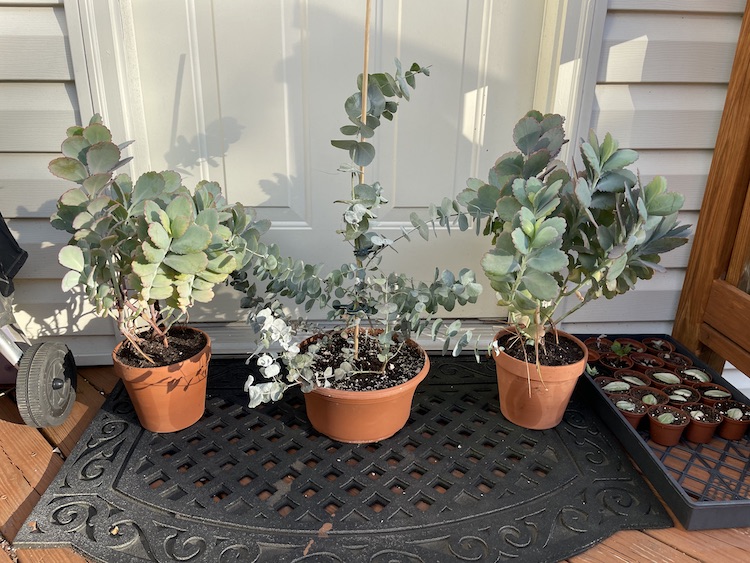Eucalyptus plants are native to Australia, but have been widely cultivated and naturalized in many parts of the world. They are prized for their aromatic foliage, attractive flowers, and medicinal properties. Eucalyptus plants prefer full sun and are quite hardy. They can be planted outdoors in deciduous climates with protection from harsh winter cold.
Silver Dollar Eucalyptus, pictured in the middle between two Kalanchoe succulents.

Some general tips on how to care for the Eucalyptus plant:
Light: Eucalyptus plants require full sun, so they should be placed in a location that receives at least 6 hours of direct sunlight per day.
Water: Eucalyptus plants prefer moist, well-draining soil. Water them deeply once a week, or more frequently in hot, dry weather. Be careful not to overwater, as this can cause root rot.
Fertilizer: Eucalyptus plants benefit from regular fertilization during the growing season (spring and summer). Use a balanced fertilizer every 4-6 weeks, following the manufacturer’s instructions. I prefer tomato fertilizer as a great overall plant fertilizer.
Pruning: Eucalyptus plants can be pruned to promote bushy growth or to control their size. Prune in late winter or early spring before new growth appears. This depends on your preferences, they are very flexible to your own growing needs.
Pests and Diseases: Eucalyptus plants are generally resistant to pests and diseases, but they can be susceptible to eucalyptus gall wasps and leaf-eating insects. Check your plants regularly and treat any infestations promptly. Click the link below to find some pest-control products that we enjoy.
Winter Care: Eucalyptus plants are generally hardy in USDA zones 8-11, but they may need protection from frost and freezing temperatures in colder areas. Mulch around the base of the plant to help insulate the roots, and cover the plant with a blanket or other protective material on cold nights.
Remember that the specific care requirements for your eucalyptus plant may vary depending on the species and your local climate, so be sure to research the specific needs of your plant and adjust your care accordingly.
